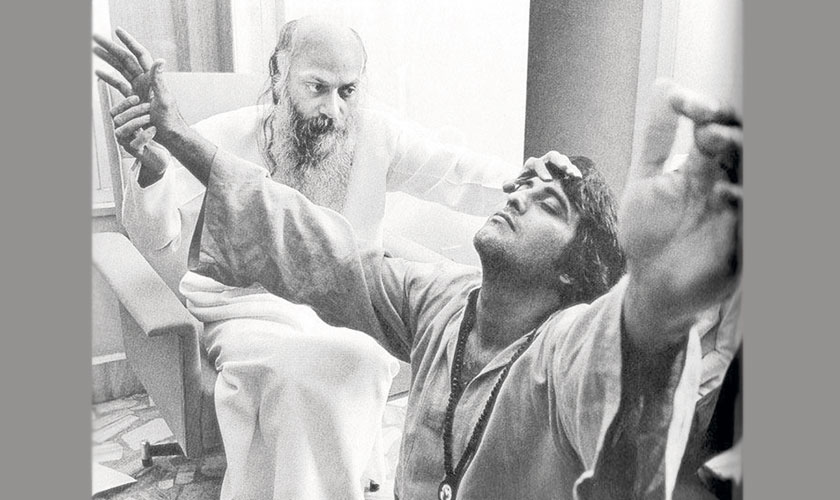The extreme narcissism of the film industry is often accused of rusting the soul. Vinod Khanna’s life and career have been coloured by his adamantine firmness to hold onto his version of divinity till his final breath. Khanna, 70, died on Thursday morning due to advanced bladder cancer.
INMemory
The charismatic star gave up his stardom to follow a more spiritually guided path in his lifetime.
The extreme narcissism of the film industry is often accused of rusting the soul. Vinod Khanna’s life and career have been coloured by his adamantine firmness to hold onto his version of divinity till his final breath. Khanna, 70, died on Thursday morning due to advanced bladder cancer.
Preoccupied by the battle between his worldly and metaphysical urges, Khanna lost out on his biggest opportunity in the 70s. The cleft-chinned, typically handsome hero had cleared every hurdle to make it big with super hits like Amar Akbar Anthony and Qurbani. But just when an eager industry was pitching him as Amitabh Bachchan’s closest rival, Khanna renounced the virtues of the box-office gods for those offered by Bhagwan Oshu Rajneesh.

Vinod Khanna with his spiritual Guru Rajneesh.
Khanna relinquished filmdom and followed Rajneesh to the USA despite the fact that he had struggled hard for his success. With a Punjabi business family and Sydenham College background, Vinod Khanna had no connections to the film industry and had to work his way up from the bottom. Sunil Dutt offered the good looking new comer the villain’s role in Man Ka Meet (1969) and soon Khanna had established himself as the young blackguard in hits like Saccha Jhoota. In Mera Gaon Mera Desh (1971), Khanna even stole some of hero Dharmendra’s thunder, with his masterly horse riding and dare devil stunts, many of which he performed himself. Dharmendra remembers how Khanna did not mind being genuinely bloodied by a belt to infuse realism into the role.
Khanna’s attractive personality was noticed by Gulzar and he effectively utilized him in leading roles in Mere Apne (1972) and Achanak (1973). The late star was tautly controlled as the love starved gang leader in Mere Apne and as the murderer leading us down the dark tunnels of his memory in Achanak. He had soon become the first villain, after Ishwarlal in the 40s to become a successful hero.
A spate of hits, Hera Pheri, Amar Akbar Anthony, Parwarish, Khoon Pasina and Muqaddar Ka Sikandar followed in tandem with Amitabh Bachchan. The audience responded to the sense of sturdy dependability that Khanna exuded as the police inspector in Inkaar and the easy machismo he brought to Qurbani which went on to eclipse Subhash Ghai’s magnum opus Karz. The press, miffed with Bachchan because he had boycotted the press, magnified Khanna’s achievements even further and declared him the only box-office challenger to Bachchan.
But the death of his adored mother deeply disturbed Khanna and set him on a spiritual quest. He would wear orange kurtas and beads around his neck, roaming the sets in the same until there was a call for the shot. A done-it-all lethargy seeped into his attitude; he sold his Mercedes, left India and spent the early 80s gardening for Rajneesh, leading a free thinking lifestyle. Every morning he would water plants and sing to the flowers at Rajneesh’s aashram. Press had no news of the star who had gone into a self exile state until the news came that Khanna had divorced his wife Geetanjali.
When Khanna returned to Bollywood with the successful Insaf (1987), his indolent sex appeal was still intact but the early inherent malleability had given way to a studied individuality. Though he could not recapture his earlier, happier days, he had reached a state of steadiness in his life after his second marriage.
One of his most memorable roles was Dayavan, the remake of Mani Ratnam’s Nayakan which was originally played by Kamal Hassan. The press drew comparisons between the two but it did not affect Khanna. He moved on with hits like Chandini and Jurm. Khanna was always in sight in the 90s and even in the new millennium playing roles of a father (Dilwale and Dabang).
Vinod Khanna was one of the rare individuals in the film world who found a balance between this world and the next. “I am a happy man; Bhagwaan Rajneesh has taught me how to maintain a balance between a spiritual and commercial existence,” he shared once.
Through his long career, Khanna dug into the very soul of his characters, but luckily for him, he kept his own soul carefully guarded from the chimera of Bollywood and not many have been able to walk this gracefully on the tight rope since.
Facts & References: The Luminaries of Bollywood
– Sadiq Saleem is a
Dubai based entertainment
journalist. He is also an
Instep correspondent and can be contacted on his
page fb/sidsaidso.